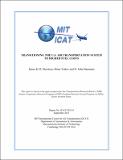Transitioning The U.S. Air Transportation System To Higher Fuel Costs
Author(s)
Morrison, James; Yutko, Brian; Hansman, R. John
Downloadmorrison-TRB-2011.pdf (1.168Mb)
Terms of use
Metadata
Show full item recordAbstract
The air transportation system enables economic
growth and provides significant social benefits.
Future increases and volatility in oil prices, as well
as climate change policies, are likely to increase the
effective cost of fuel. We investigate the expected
impacts of higher fuel costs on the U.S. domestic air
transportation system and discuss policy options to
reduce negative economic and social effects. The
2004-08 fuel price surge is used as a historical case
study. A stochastic simulation model is developed
using price elasticity of demand assumptions and
flight leg fuel burn estimates to understand the
impacts of higher fuel costs. It was found that a
50% increase in fuel prices is expected to result in a
12% reduction in ASMs if all cost increases pass
through to passengers. System revenues are
expected to decrease marginally for fuel price
increases up to 50%, but higher increases may
result in significant revenue reductions. Small
airports are expected to experience relatively larger
decreases and greater volatility in traffic. Older
aircraft, flying sectors significantly below their
optimal fuel efficiency range, are expected to
experience the greatest reductions in capacity. An
airline case study demonstrates that a regional
carrier may be less sensitive to increased fuel prices
than other business models. Policy options to
maintain small community access, to manage
airport traffic volatility, and to improve fleet fuel
efficiency are discussed. To transition the U.S. air
transportation system to higher fuel costs,
stakeholder action will be required.
Date issued
2011-09-20Series/Report no.
IcAT;2011-8
Keywords
air transportation, oil prices, climate change, fuel costs
Collections
The following license files are associated with this item: